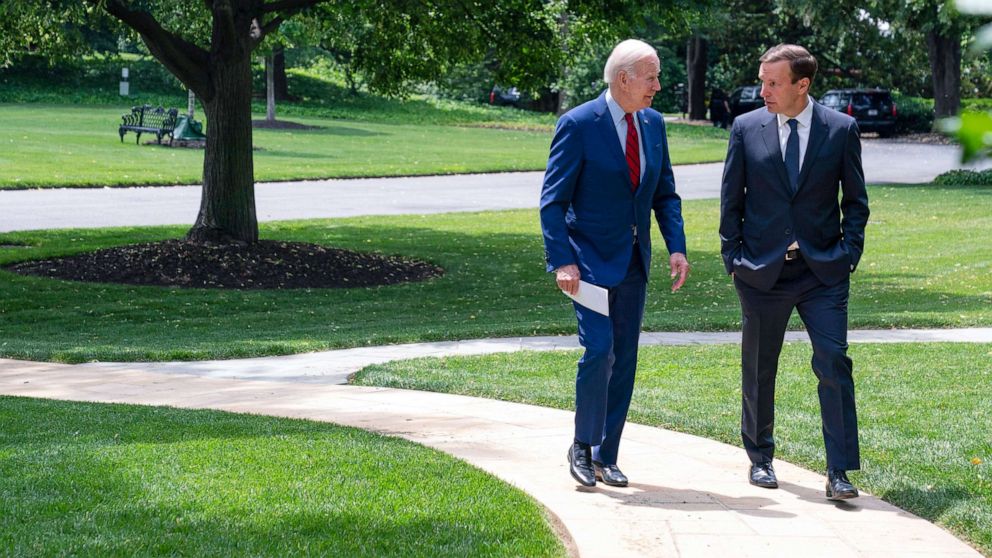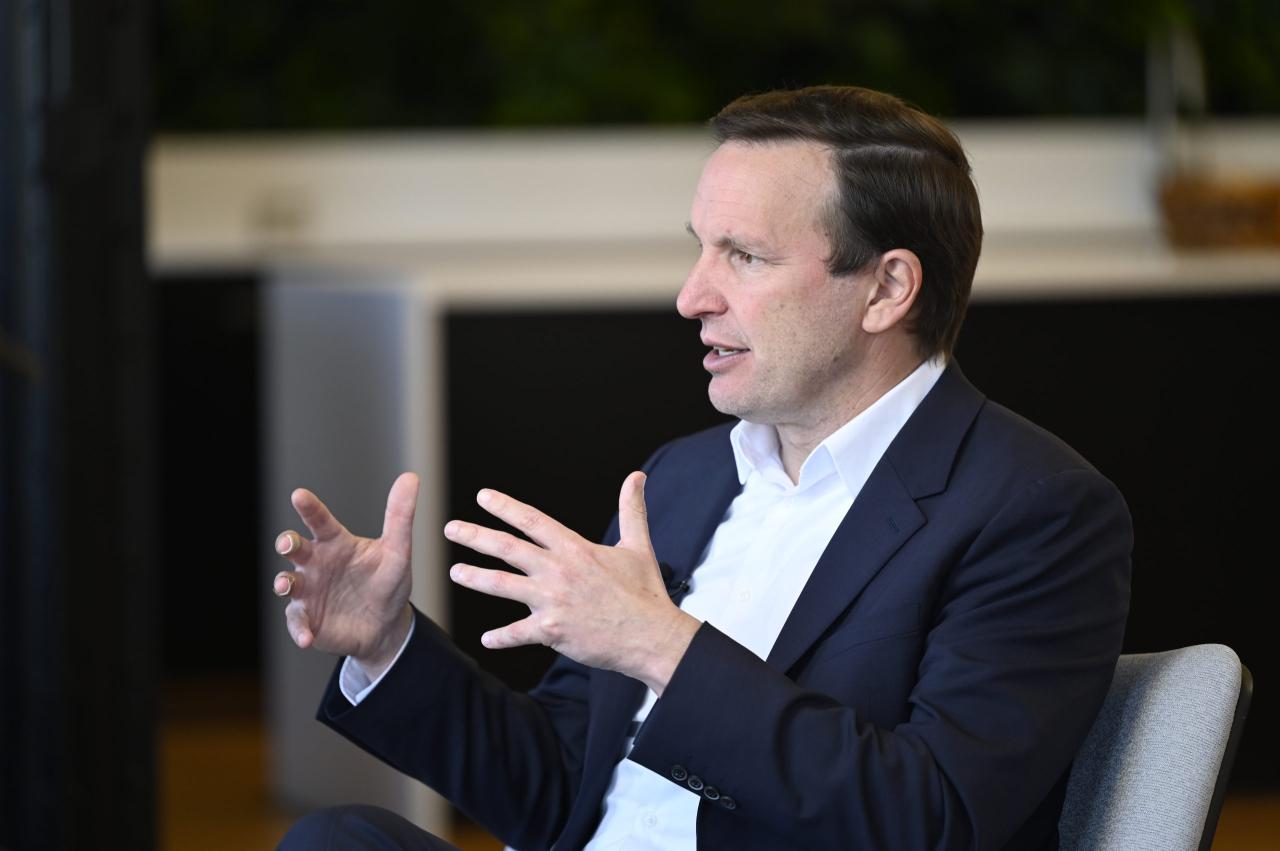
Sen Chris Murphy Thinks Congress Can Make a Difference
Sen Chris Murphy Thinks Congress Can Make a Difference, and he’s not afraid to say it. Senator Murphy, known for his outspoken views on a range of issues, believes that Congress has the power to address some of the most pressing challenges facing our nation.
From healthcare and education to national security and climate change, Senator Murphy sees a role for Congress in shaping a better future for all Americans. But he also acknowledges the hurdles that stand in the way of legislative action, particularly in an era of intense political polarization.
This blog delves into Senator Murphy’s perspective on the role of Congress in addressing these critical issues. We’ll explore his key legislative priorities, his views on the powers and limitations of Congress, and his strategies for influencing policy decisions. We’ll also examine the challenges he faces in achieving his goals and the potential impact of his actions on the political landscape.
Senator Chris Murphy’s Legislative Focus
Senator Chris Murphy, representing Connecticut in the U.S. Senate, is known for his progressive stances and active involvement in various legislative efforts. He prioritizes policies aimed at improving the lives of everyday Americans, focusing on issues like healthcare, gun control, education, and climate change.
His legislative work reflects his commitment to these priorities, and he has consistently advocated for policies that address these challenges.
Healthcare
Senator Murphy believes that healthcare is a fundamental human right and has been a vocal advocate for expanding access to affordable healthcare. He has been a strong supporter of the Affordable Care Act (ACA), often referring to it as a vital step towards ensuring healthcare access for all Americans.
His efforts have included working to protect and strengthen the ACA, fighting against attempts to repeal it, and pushing for policies that expand coverage and lower costs.
Congressional Powers and Limitations
The United States Congress, a bicameral legislature consisting of the Senate and the House of Representatives, plays a crucial role in the American political system. Established by the U.S. Constitution, Congress is vested with specific powers to legislate, oversee, and represent the interests of the American people.
However, these powers are not absolute and are subject to limitations, primarily through the principle of separation of powers.
Powers Granted to Congress
The U.S. Constitution Artikels the specific powers granted to Congress in Article I, Section
8. These powers can be broadly categorized as follows
- Legislative Powers:Congress’s primary function is to make laws for the nation. This includes the power to enact legislation on a wide range of subjects, including taxation, spending, commerce, defense, and immigration. For example, Congress has the power to declare war, raise an army and navy, and regulate interstate commerce.
- Oversight Powers:Congress has the authority to oversee the executive branch, ensuring that the laws enacted by Congress are faithfully executed. This includes holding hearings, conducting investigations, and issuing subpoenas. For instance, Congress can investigate government agencies and hold hearings to examine their performance and accountability.
- Appropriations Powers:Congress controls the federal purse strings, having the power to appropriate funds for government operations and programs. This includes setting budgets, allocating funds, and authorizing spending. For example, Congress appropriates funds for the military, education, and healthcare.
- Impeachment Powers:Congress has the power to impeach and remove federal officials, including the President, Vice President, and federal judges. The House of Representatives has the sole power to impeach, while the Senate has the sole power to try all impeachments.
- Ratification Powers:Congress has the power to ratify treaties negotiated by the President. This requires a two-thirds majority vote in the Senate.
Limitations on Congressional Power
The principle of separation of powers, enshrined in the U.S. Constitution, aims to prevent any one branch of government from becoming too powerful. This principle imposes limitations on Congressional power, primarily through:
- Checks and Balances:The separation of powers doctrine establishes a system of checks and balances among the three branches of government. The President can veto legislation passed by Congress, while Congress can override a Presidential veto with a two-thirds majority vote in both houses.
The judiciary has the power to review laws passed by Congress and determine their constitutionality.
- Judicial Review:The Supreme Court has the power to review laws passed by Congress and determine their constitutionality. If the Court finds a law to be unconstitutional, it can be struck down.
- Enumerated Powers:The Constitution limits Congress to exercising only those powers specifically enumerated in the document. This principle is known as the “enumerated powers” doctrine.
- Bill of Rights:The Bill of Rights, consisting of the first ten amendments to the Constitution, guarantees certain individual liberties that Congress cannot infringe upon. These include freedom of speech, religion, press, assembly, and the right to bear arms.
The Legislative Process
The legislative process is a complex and multifaceted process through which bills are introduced, debated, amended, and ultimately enacted into law. The process typically involves the following steps:
- Introduction:A bill is introduced in either the House of Representatives or the Senate.
- Committee Consideration:The bill is referred to a relevant committee, where it is reviewed, debated, and potentially amended.
- Floor Debate:If the bill is approved by the committee, it is brought to the floor of the House or Senate for debate and a vote.
- Conference Committee:If the House and Senate pass different versions of the bill, a conference committee is formed to reconcile the differences.
- Presidential Action:Once the bill is passed by both houses, it is sent to the President for approval. The President can sign the bill into law, veto the bill, or allow it to become law without a signature.
Senator Murphy’s Views on Congressional Action

Senator Chris Murphy, a Democratic senator from Connecticut, has been a vocal advocate for legislative action on a range of issues, particularly gun control and climate change. His views on the role of Congress in addressing current challenges reflect a belief in the power of legislation to enact positive change.
He often emphasizes the importance of Congress taking action to address pressing problems, even when faced with political gridlock or resistance from the other party.Murphy’s perspective is shaped by his experience in Congress, where he has witnessed firsthand the challenges of passing legislation.
He has also been involved in numerous high-profile efforts to address gun violence, including the aftermath of the Sandy Hook Elementary School shooting in his home state. This experience has solidified his belief in the importance of legislative action to address national crises.
Murphy’s Approach to Legislative Action
Murphy’s approach to legislative action is characterized by a combination of pragmatism and principle. He has shown a willingness to work across the aisle to find common ground on issues, but he is also unafraid to stand up for his principles and push for legislation that he believes is necessary.
This approach has been evident in his work on gun control, where he has sought to find compromise while also advocating for stricter gun laws.Murphy’s approach can be contrasted with that of some other members of Congress who prioritize partisan politics over finding solutions.
Some members of Congress are more likely to focus on scoring political points rather than working to pass legislation that could address real-world problems. In contrast, Murphy’s approach emphasizes the importance of finding common ground and working together to achieve meaningful change.
Examples of Murphy’s Legislative Efforts
One example of Murphy’s approach to legislative action is his work on the Bipartisan Safer Communities Act, a gun control bill that was passed in 2022. The bill was the result of a compromise between Democrats and Republicans, and it included measures such as enhanced background checks and funding for mental health programs.
Murphy played a key role in negotiating the bill, and he has been praised for his willingness to work across the aisle to find a solution.Another example is Murphy’s advocacy for climate change legislation. He has been a vocal critic of the fossil fuel industry, and he has worked to pass legislation that would reduce greenhouse gas emissions.
Senator Chris Murphy thinks Congress can address the growing national debt by enacting policies that promote economic growth. This might involve making investments in infrastructure, education, and research, which could stimulate demand and create jobs. However, recent trends suggest that the economic picture is more complex than that.
A recent article on epic goods buying spree wanes as consumers ramp up services spending highlights a shift in consumer spending patterns, with services taking precedence over goods. This suggests that policymakers need to consider a broader range of factors when tackling the debt, including the changing nature of consumer spending and its implications for economic growth.
He has also been a strong supporter of the Green New Deal, a proposal that calls for a massive investment in renewable energy and infrastructure. While the Green New Deal has faced significant opposition, Murphy’s commitment to addressing climate change demonstrates his willingness to take on challenging issues.
Murphy’s Views on the Effectiveness of Congress
Murphy’s views on the effectiveness of Congress are complex. He has expressed both frustration and optimism about the ability of Congress to address pressing challenges. He has acknowledged the challenges of political gridlock and the difficulty of passing meaningful legislation, but he has also maintained that Congress is capable of enacting positive change.Murphy’s views are shaped by his belief in the power of democracy and the importance of representative government.
He believes that Congress has a responsibility to address the needs of the American people, and he is committed to working within the system to achieve meaningful change.
Specific Issues Senator Murphy Believes Congress Can Address

Senator Chris Murphy, a Democrat from Connecticut, believes that Congress has a crucial role to play in addressing some of the most pressing issues facing the nation. He advocates for a proactive approach to legislation, emphasizing the need for meaningful action to improve the lives of Americans.
Senator Murphy’s legislative focus spans several key policy areas, each with a direct impact on the well-being of citizens. He champions policies that aim to address economic inequality, gun violence, climate change, and healthcare access. He believes that Congress has the power to enact meaningful change in these areas, and he actively seeks to advance legislation that will make a real difference.
Gun Violence Prevention
Senator Murphy is a vocal advocate for gun violence prevention, driven by the tragic mass shootings that have plagued the United States. He believes that Congress has a responsibility to act to prevent future tragedies and protect American lives. Senator Murphy has introduced and co-sponsored numerous bills aimed at reducing gun violence, including measures to expand background checks, ban assault weapons, and limit high-capacity magazines.
He argues that these measures are essential to prevent the loss of innocent lives and create a safer environment for all Americans.
“We have a moral obligation to act. We cannot continue to stand by while innocent people are killed by gun violence. We need to pass common-sense gun safety laws to prevent these tragedies from happening again.”
Senator Chris Murphy
Climate Change Mitigation
Senator Murphy recognizes the urgent threat posed by climate change and the need for swift action to mitigate its devastating effects. He believes that Congress has a responsibility to act to protect the environment and ensure a sustainable future for generations to come.
He supports policies that promote clean energy, reduce greenhouse gas emissions, and invest in climate adaptation measures. Senator Murphy has co-sponsored legislation aimed at achieving a clean energy future, including the Green New Deal, which proposes a comprehensive plan to address climate change and economic inequality.
He argues that these policies are essential to protect the planet, create jobs, and ensure a more just and equitable society.
“Climate change is the greatest challenge of our time. We need to act now to protect our planet and ensure a sustainable future for our children and grandchildren.”
Senator Chris Murphy
Challenges and Obstacles to Congressional Action
The legislative process in the United States Congress is complex and often fraught with challenges. These challenges can significantly impact the ability of lawmakers, like Senator Chris Murphy, to enact legislation and achieve their policy goals.
Political Polarization and Partisanship, Sen chris murphy thinks congress can
Political polarization and partisanship have become increasingly prevalent in recent years, significantly hindering legislative progress. This divide makes it difficult for lawmakers from opposing parties to find common ground and compromise on key issues. The result is often gridlock, where legislation stalls or fails to pass due to the inability of opposing parties to reach consensus.
Senator Chris Murphy believes Congress can make a real difference in addressing the economic challenges facing the country, but it’s important to understand the global context. The recent weakening of the Japanese yen, the weakest it’s been in 20 years, is a major factor impacting global markets, and understanding the reasons behind it is crucial.
This analysis delves into the factors contributing to the yen’s decline and its implications. By grasping these complexities, Congress can make informed decisions that support a strong economy and address the challenges facing the American people.
- Stalemates and Deadlock:Political polarization often leads to legislative stalemates and deadlock. When parties hold opposing views on critical issues, they may refuse to compromise, resulting in bills being blocked or failing to advance. This can significantly delay or even prevent the enactment of important legislation.
- Increased Use of Filibusters:The filibuster, a procedural tactic in the Senate that allows a single senator to delay a vote indefinitely, has been used more frequently in recent years. This tactic has been employed by both parties to obstruct legislation they oppose, further exacerbating gridlock and making it harder to pass bills.
Sen. Chris Murphy thinks Congress can make real progress on gun safety legislation, and the recent testimony from former Attorney General William Barr at the January 6th hearings offers a glimmer of hope. Barr, who served under President Trump, unequivocally called the claims of a stolen election “bullshit” in his testimony, which was widely reported in the media.
If a high-ranking official like Barr can speak out against the falsehoods that fueled the attack on the Capitol, perhaps Congress can finally move forward on meaningful legislation that protects our democracy and our communities.
- Hyper-Partisanship:The rise of hyper-partisanship, where lawmakers prioritize party loyalty over finding common ground, has made it more difficult for Congress to address pressing issues. This can lead to a situation where lawmakers are more focused on scoring political points than on finding solutions that benefit the nation as a whole.
Impact on Senator Murphy’s Legislative Goals
The challenges of political polarization and partisanship have a direct impact on Senator Murphy’s ability to achieve his legislative goals. His efforts to pass legislation on issues like gun control, healthcare, and climate change are likely to face significant opposition from Republicans.
The high level of partisanship in Congress makes it difficult to build bipartisan support for these initiatives, even if they are popular with the public.
“The level of partisanship in Congress is a real obstacle to getting things done. It’s hard to find common ground when both sides are so entrenched in their positions.”
Senator Chris Murphy
Senator Murphy’s Strategies for Influencing Congressional Action
Senator Chris Murphy, a Democrat from Connecticut, is known for his passionate advocacy on a range of issues, particularly gun control and foreign policy. His approach to influencing congressional action is multifaceted, combining strategic public engagement with effective legislative tactics.
Public Statements and Media Appearances
Senator Murphy frequently utilizes public statements and media appearances to raise awareness about issues he considers crucial. He strategically chooses platforms that reach broad audiences, such as national television interviews and social media, to amplify his message. For instance, in the aftermath of the 2012 Sandy Hook Elementary School shooting, Senator Murphy delivered a powerful and emotional speech on the Senate floor, urging his colleagues to take action on gun control.
This speech garnered significant media attention and public support for stricter gun laws.
Legislative Tactics
Senator Murphy is a skilled legislator who leverages various tactics to influence legislation. He actively participates in committee hearings, introducing amendments, and negotiating with colleagues to advance his policy priorities. He also utilizes his position on influential committees, such as the Senate Foreign Relations Committee, to shape legislation and influence policy decisions.
Effectiveness of Strategies
Senator Murphy’s strategies have proven effective in advancing his policy goals on several occasions. His consistent advocacy on gun control has helped to raise public awareness and pressure lawmakers to address the issue. His efforts have contributed to the passage of legislation, such as the Bipartisan Safer Communities Act, which included measures to enhance background checks and provide funding for mental health programs.
Similarly, his work on foreign policy has led to the passage of legislation that strengthens U.S. alliances and addresses global challenges.
Final Conclusion: Sen Chris Murphy Thinks Congress Can

Senator Murphy’s belief in the power of Congress to make a difference is a powerful message in a time of political gridlock and cynicism. His willingness to speak out on important issues, even when it’s difficult, is a reminder that even in the face of adversity, there’s still room for progress.
Whether his efforts will ultimately succeed in driving meaningful change remains to be seen, but his commitment to the legislative process and his unwavering conviction in the power of Congress to address the challenges facing our nation is a beacon of hope in a time of uncertainty.






